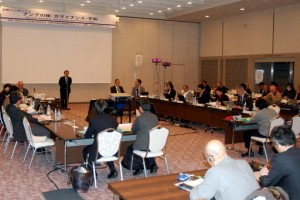Experts at international symposium in Hiroshima discuss “Nuclear Weapons, Governance and Peace in Asia”
Mar. 18, 2018
by Yumi Kanazaki, Staff Writer
On March 17, an international symposium titled “Nuclear Weapons, Governance and Peace in Asia” was held at the International Conference Center Hiroshima in Naka Ward. The participants, including experts from China and South Korea, discussed the nuclear dilemma involving North Korea and other regional challenges in Asia. The event was sponsored by the Hiroshima Peace Institute at Hiroshima City University and the Research Center for Nuclear Weapons Abolition at Nagasaki University (RECNA).
Kim Sung Chull, a professor at Seoul National University in South Korea, pointed out that North Korea moved to expedite its nuclear development efforts 17 years ago, when the United States warned of a pre-emptive attack and regime change after the terrorist attacks that took place in the United States on September 11, 2001. Regarding the possibility of a first-ever summit between the United States and North Korea, for which the leaders of both countries have expressed their willingness, Professor Kim said that the top priority for North Korean leader Kim Jong-un is to have the United States guarantee the continuation of his regime. However, he stressed that the key part of these negotiations would have to be the denuclearization of North Korea and that other nations concerned, including Japan, must be involved even if these are bilateral talks.
On the other hand, Lee Seong-hyon, a research fellow at Sejong Institute, presented his view that China, North Korea’s longtime ally, will not be inclined to vigorously press North Korea to denuclearize because China is afraid of the collapse of the regime. China’s stance is unlikely to change unless the relationship between the United States and North Korea improves.
The participants also raised questions about potential scenarios, such as the United States guaranteeing that North Korea could maintain its current regime and become a nuclear state. From a different perspective, this scenario, if denuclearization is not required, might lead to better, more stable relations between the United States and North Korea.
Narayanan Ganesan, a professor at the Hiroshima Peace Institute, also reported on current conditions involving the nations of Southeast Asia. The symposium will continue until March 18.
(Originally published on March 18, 2018)
On March 17, an international symposium titled “Nuclear Weapons, Governance and Peace in Asia” was held at the International Conference Center Hiroshima in Naka Ward. The participants, including experts from China and South Korea, discussed the nuclear dilemma involving North Korea and other regional challenges in Asia. The event was sponsored by the Hiroshima Peace Institute at Hiroshima City University and the Research Center for Nuclear Weapons Abolition at Nagasaki University (RECNA).
Kim Sung Chull, a professor at Seoul National University in South Korea, pointed out that North Korea moved to expedite its nuclear development efforts 17 years ago, when the United States warned of a pre-emptive attack and regime change after the terrorist attacks that took place in the United States on September 11, 2001. Regarding the possibility of a first-ever summit between the United States and North Korea, for which the leaders of both countries have expressed their willingness, Professor Kim said that the top priority for North Korean leader Kim Jong-un is to have the United States guarantee the continuation of his regime. However, he stressed that the key part of these negotiations would have to be the denuclearization of North Korea and that other nations concerned, including Japan, must be involved even if these are bilateral talks.
On the other hand, Lee Seong-hyon, a research fellow at Sejong Institute, presented his view that China, North Korea’s longtime ally, will not be inclined to vigorously press North Korea to denuclearize because China is afraid of the collapse of the regime. China’s stance is unlikely to change unless the relationship between the United States and North Korea improves.
The participants also raised questions about potential scenarios, such as the United States guaranteeing that North Korea could maintain its current regime and become a nuclear state. From a different perspective, this scenario, if denuclearization is not required, might lead to better, more stable relations between the United States and North Korea.
Narayanan Ganesan, a professor at the Hiroshima Peace Institute, also reported on current conditions involving the nations of Southeast Asia. The symposium will continue until March 18.
(Originally published on March 18, 2018)








